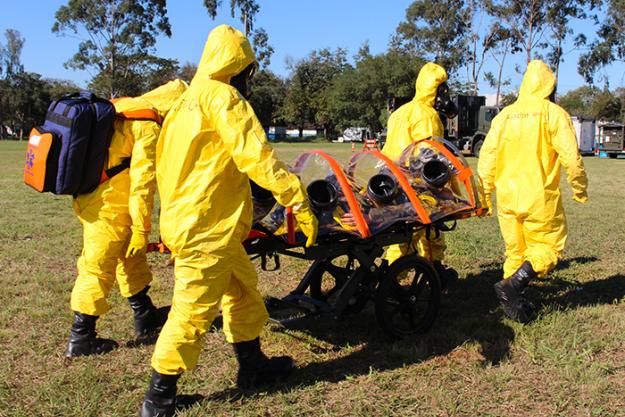
THE HAGUE, the Netherlands — 7 September 2018 — First Responders from Latin America acquired essential knowledge on responding to emergencies involving hazardous chemicals after an Exercise on Assistance and Protection against Chemical Weapons (EXBRALC III 2018) training held in Rio de Janeiro, Brazil, from 27-31 August.
The exercise was co-organised by the Organisation for the Prohibition of Chemical Weapons (OPCW) and the Brazilian Government, and aimed to boost the skills gained by the first responders during the basic and advanced course held in Costa Rica in 2017.
During the opening ceremony, Representative of Ministry of Science and Technology, Minister Luis Felipe Silvério Fortuna, expressed his appreciation of the successful cooperation between Brazil and the OPCW and stated: “Brazil remains committed to supporting the full implementation of the Chemical Weapons Convention, especially in the areas of non-proliferation, international cooperation, and assistance and protection. Under the framework of Article X of the Convention, we continue promoting cooperation with other States Parties in particular with regard to the region of Latin America and the Caribbean, as well as Portuguese speaking States Parties.”
Senior Program Officer of OPCW’s International Cooperation and Assistance Division, Mr Shahriar Khateri, underlined that such trainings are “important in building reliable national and regional capacities to protect citizens during chemical emergencies”.
The course benefited 40 participants representing various agencies involved in emergency response in Latin American countries.

Background
Brazil has been actively cooperating in regional and international capacity-building activities since 2009 and is an important partner for the OPCW in the provision of chemical defense training in Latin America and the Caribbean region.
Brazil and the OPCW have so far co-organised five regional exercises in assistance and protection against chemical weapons.
As the implementing body for the Chemical Weapons Convention, the OPCW, with its 193 Member States, oversees the global endeavour to permanently eliminate chemical weapons. Since the Convention’s entry into force in 1997, it is the most successful disarmament treaty eliminating an entire class of weapons of mass destruction.
Over 96 per cent of all chemical weapon stockpiles declared by possessor States have been destroyed under OPCW verification. For its extensive efforts in eliminating chemical weapons, the OPCW received the 2013 Nobel Prize for Peace.
